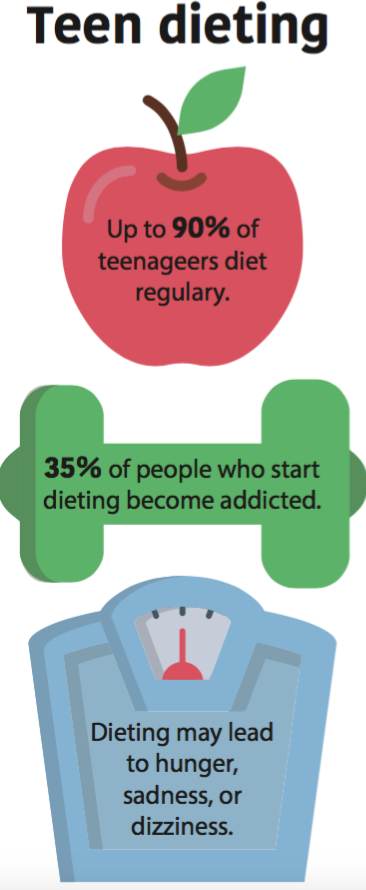Perfect body comes with a price
Dieting for a ‘summer body’ can bring health risks.
Source: Livestrong
May 2, 2017
As the summer season and warmer weather draw near — and lighter, more revealing clothing becomes more popular — many teens focus on developing the “perfect summer body” through diets or exercise routines, but weight loss can be detrimental to one’s health.
“There are a lot of different reasons — personal, media society,” registered dietitian Sabine Haake said, explaining the various pressures that can influence teens into feeling a need to lose weight, “but the most important reason is that in the summer there tends to be less clothing and therefore a greater focus on your body.”
Cosmopolitan and Daily Mail advertise fast-acting diets and specialized exercise routines to get rapid weight loss results just in time for the summer season. Popular print and social media can subconsciously pressure teens to change their appearance, according to senior Olivia Hoekendijk.
“A lot of celebrities use the term ‘summer body,’ and I think they’re trying to influence people to look a certain way,” Hoekendijk said.
Celebrity Instagram users such as Kylie Jenner and Demi Lovato promote methods to lose weight for the summer and can make teens feel that they are not ready for the summer, according to Hoekendijk.
“My cousin mentioned last summer when we were on vacation that she thought she wasn’t summer-ready because she didn’t diet,” Hoekendijk said.
Dieting and weight loss can be hazardous to one’s health, according to Haake.
“Many high school girls will have had a growth spurt but many of them will have not,” Haake said. “Even if you already had your growth spurt at age 14, 15 or 16, you are still growing. Any kind of weight loss during a time of active growth is associated with a whole bunch of medical complications.”
Dieting as a growing teen girl can lead to stagnant growth and menstrual irregularity as well as bone diseases like osteopenia and osteoporosis, according to a report by the U.S. National Institutes of Health’s National Library of Medicine.
“You don’t want a child, a teenager or a young person to lose weight because that can impair all of these growth processes that are going on,” Haake said.
Dieting can also result in a decline to a person’s metabolism and, when dieting is repeated, metabolism can decrease indefinitely, according to Haake.
“Research shows that after about a day-and-a-half of dieting, metabolism can drop by as much as 40 percent,” Haake said. “Let’s say you diet every year, you basically expose your body to that kind of activity over and over again and your body thinks ‘I am going to lower my metabolism permanently.’”
Learning to have a balanced eating regime will have a better long-term positive effect on one’s body, according to Haake.
“If you can figure out a routine that works for you, gives you the energy and nutrients you need to be healthy and an activity routine that you can sustain, you will have lasting habits that not only maintain a body shape or stabilize weight but can also make you healthier,” Haake said.










